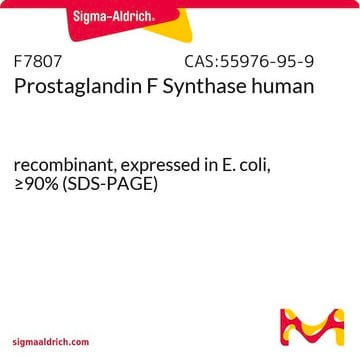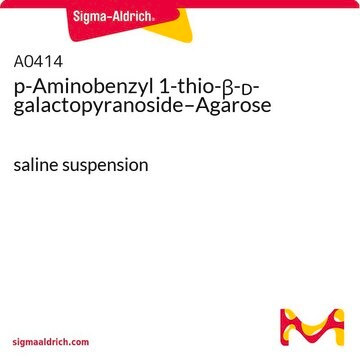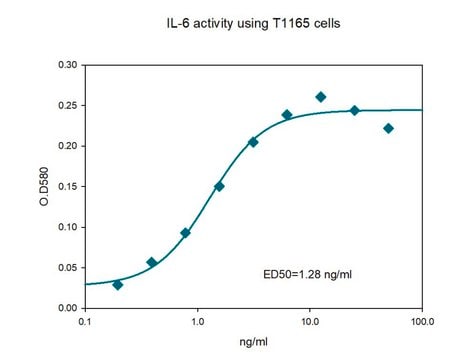P3360
Prostate Specific Antigen–α1-Antichymotrypsin Complex human
≥99% (SDS-PAGE), buffered aqueous solution
Synonym(s):
PSA-ACT
Sign Into View Organizational & Contract Pricing
All Photos(1)
About This Item
Recommended Products
biological source
human
Quality Level
Assay
≥99% (SDS-PAGE)
form
buffered aqueous solution
shipped in
wet ice
storage temp.
−20°C
Gene Information
human ... KLK3(354) , SERPINA3(12)
General description
Kallikrein-3 (KLK3) or prostate specific antigen (PSA) is a serine protease. The protein contains a 371-residue N-terminal heavy chain, which is composed of four Apple domains. The PSA gene is localized to human chromosome 4q35. PSA is synthesized in the liver as a proenzyme known as prekallikrein. It is a key component of the kinin-generating pathways (PK system). The protein is involved in important physiological roles, such as blood pressure modulation, complement activation, and control and maintenance of inflammatory responses. KLK3b alleles are found to be associated with end-stage renal disease (ESRD) suggesting that variants in KLK3 gene might be linked with ESRD susceptibility.
SERPINA3 is also known as α-1-antichymotrypsin (ACT or AACT). The gene consists of five exons and is mapped to human chromosome 14q32.13. The protein contains 423 amino acids and belongs to the family of serpin superfamily of protease inhibitors. SERPINA3 inhibits the activity of pancreatic chymotrypsin, leukocyte, cathepsin G, mast cell chymases, human glandular, kallikrein 2 and kallikrein 3. Elevated expression of the protein has been observed in various types of carcinomas including breast carcinoma, hepatocellular carcinoma, prostate carcinoma and adenocarcinoma of the lung.
SERPINA3 is also known as α-1-antichymotrypsin (ACT or AACT). The gene consists of five exons and is mapped to human chromosome 14q32.13. The protein contains 423 amino acids and belongs to the family of serpin superfamily of protease inhibitors. SERPINA3 inhibits the activity of pancreatic chymotrypsin, leukocyte, cathepsin G, mast cell chymases, human glandular, kallikrein 2 and kallikrein 3. Elevated expression of the protein has been observed in various types of carcinomas including breast carcinoma, hepatocellular carcinoma, prostate carcinoma and adenocarcinoma of the lung.
Other Notes
PSA from Human seminal fluid; Antichymotrypsin from human plasma
Physical form
Solution in 10 mM Sodium Acetate pH 5.6, 150 mM sodium chloride and 0.1% sodium azide.
Storage Class Code
12 - Non Combustible Liquids
WGK
nwg
Flash Point(F)
Not applicable
Flash Point(C)
Not applicable
Certificates of Analysis (COA)
Search for Certificates of Analysis (COA) by entering the products Lot/Batch Number. Lot and Batch Numbers can be found on a product’s label following the words ‘Lot’ or ‘Batch’.
Already Own This Product?
Find documentation for the products that you have recently purchased in the Document Library.
Identification of human plasma kallikrein gene polymorphisms and evaluation of their role in end-stage renal disease.
Yu H
Hypertension, 31(4) (1998)
Expression, crystallization, and three-dimensional structure of the catalytic domain of human plasma kallikrein.
Tang J
The Journal of Biological Chemistry, 280(49) (2005)
Down-regulated expression of SERPIN genes located on chromosome 18q21 in oral squamous cell carcinomas.
Shiiba M
Oncology Reports, 24(1) (2010)
SERPINA3 (aka alpha-1-antichymotrypsin).
Baker C
Frontiers in Bioscience (2007)
SERPINA3 promotes endometrial cancer cells growth by regulating G2/M cell cycle checkpoint and apoptosis.
International Journal of Clinical and Experimental Pathology (2014)
Our team of scientists has experience in all areas of research including Life Science, Material Science, Chemical Synthesis, Chromatography, Analytical and many others.
Contact Technical Service







